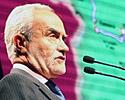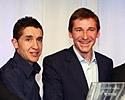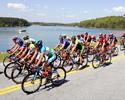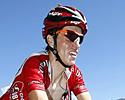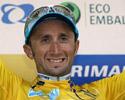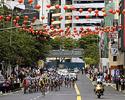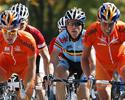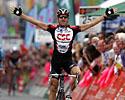First Edition Cycling News for December 6, 2007Edited by Sue George with assistance from Susan Westemeyer Vuelta 2008: One for the mountain menBy Shane Stokes in Madrid
The climbers can celebrate. A return to the gruelling Angliru, a very tough day in the Pyrenees, an uphill time trial, a total of five summit finishes and just 40 kilometres of flat time trial for the specialists against the clock; the 2008 Vuelta a España, in truth, will be tailor-made for those who shine when it comes to battling with gravity. Starting in Granada on August 30, 2008, and concluding in Madrid 23 days and 3,169 kilometres later, the Grand Tour will be fought on uphill terrain and should see some epic tussles by the mountain riders in the battle for the final maillot oro. "I think the race will be for the climbers," said race director Victor Cordero to Cyclingnews. "We have four summit finishes plus the uphill time trial. We will have surprises, we have things to offer the climbers and the time trial kilometres have been really limited. "The first time trial is just 40 kilometres. It is not the longest time trial to have been in the Vuelta and the specialists will be limited as regards what they can gain. Because of that, I believe that this is a race that is more for climbers than time trialists." The 2008 edition of the race gets underway in Granada with a seven kilometre team time trial, almost exactly replicating the 7.2 kilometre test which kicked off the 2006 Vuelta in nearby Málaga. After three mainly flat stages, the riders cross swords in a 40 kilometre race against the clock based around Ciudad Real, then have one more leg before the first rest day. A transfer to Barbastro in the north east of the country gets three tough climbing legs underway, with the first of these – a summit finish to Andorra (Naturlandia – La Rabassa) the longest, and quite probably the hardest, of the race. Two more mountain legs follow (including a summit finish at Pla de Beret, where defending Vuelta champion Denis Menchov won the 11th stage of the 2006 Tour de France), then three flatter stages precede another transfer and the second rest day. The climbing mayhem begins again immediately afterwards with the 199 kilometre race to the summit of the backbreaking l'Angliru and another mountain-top finish at the ski station Fuentes de Invierno. A respite from climbing gives the sprinters and roulers four flattish stages to target – five if they get over the two early first category climbs on stage 19 – before a climatic 16 kilometre uphill time trial to the Puerto de Navacerrada. That stage will surely reveal the 2008 victor with just the final processional stage to Madrid standing in between him and the Grand Tour title.
Carlos Sastre (CSC) was one of the main animators of this year's race and the 2007 runner-up liked what he saw. "I think that this is better for the climbers," he stated at the launch at the IFEMA centre in Madrid. "There is only a small amount of time trials and in that way it is good for me…I am not a heavy rider, I have to suffer a lot not to lose time in long, flat time trials. "This type of route is not easy but it is better for me to get something. If I do the Vuelta a España, for sure this type of course is hard and is good for a climber like myself." There is much hype about the return of the Angliru, reckoned by many to be one of the hardest climbs in Europe. However Sastre thinks another day may be more decisive. "I think that the stage to Andorra is a more difficult stage than that to the Angliru. The stage to La Rabassa [in Andorra] is the biggest mountain stage in this Vuelta a España, it is a real mountain stage. For sure the Angliru is popular, for the media it is important, and it is a hard climb, a hard stage. But I think that in the previous times it was used, it didn't make a big difference to the final result." To read the complete preview, including more reactions and details on the route, click here. Tour de Georgia announces 2008 routeBy Laura Weislo
Overshadowed somewhat by the announcement of the Vuelta a España, the organisers of the Tour de Georgia unveiled a new and interesting route for the 2008 edition on Wednesday, one which will bring the US its first team time trial in a stage race of this caliber since the 1980s, replacing the usual individual time trial. The race will feature five new host cities including the Braseltown race track "Road Atlanta" which will host the team time trial. The 2008 edition of the Tour de Georgia will begin offshore on Tybee Island, and then travel inland to the historic city of Savannah. Stage two will begin further inland in Statesboro and head northwest to Augusta, famous for hosting the Masters PGA tournament. Stage three will begin in Washington and head north of Atlanta to Gainesville, where the riders will prepare for the next day's team time trial in nearby Braselton. The team time trial will take place on the Road Atlanta grand prix circuit, but race director Jim Birell of Medalist Sports said the team time trial's distance is still undetermined. The 2.54 mile grand prix circuit is rather hilly, and Birell hinted that they will have to take several factors into account in order to balance the stage with the rest of the Tour. Slipstream's Will Frischkorn was on hand to comment on the course, and was excited about the inclusion of the team time trial, which he feels will favour his squad. "It should add an interesting dynamic to the race that should change things up a bit," said the winner of the Most Aggressive rider award of the 2007 edition. Stage five heads to the hills, beginning in the college town of Suwanee and heading to Dahlonega, where the riders will have their first taste of the mountains before heading into the Queen stage the next day to Brasstown Bald. The 4,784 foot mountain has been a decisive factor in the race since Cesar Grajales won the first finish there in 2004. Grajales, who attended the press conference, will return in 2008 with the Rock Racing team. 2007 winner Janez Brajkovic hopes to return with his new Astana squad to defend his title. "The Tour de Georgia is a race I love because of the amazing fans and how well it fits in with my racing schedule. Being the best young rider in 2006 was great, but winning the whole race in 2007 was the highlight of my racing career. I am always asking my directors to do more races in the U.S. and I plan to be back again in April," said Brajkovic. The 2007 Tour de Georgia was held after a last minute scramble for sponsorship dollars, with the state of Georgia stepping in to help fund the economically important event along with corporate sponsors. The organisers have not announced a new title sponsor, but Georgia Lieutenant governor Casey Cagel was on hand to ensure the state's continued support. "We're in a much better situation than we were last year," said Birrell. "There's so much more stability in the future of this event. And the success of the last five years has really cemented the lieutenant governor's passion and support for making this thing bigger and better than it has been in the past." Cofidis reconsiders sponsorship intentions
After previously contemplating terminating its sponsorship at the end of 2008, Cofidis announced Wednesday that it has in fact extended its sponsorship through the end of 2009. The news draws the involvement of Cofidis as a major cycling sponsor out to twelve years and comes in spite of the positive doping test (for testosterone) of Italian rider Cristian Moreni during this summer's Tour de France and the subsequent withdrawal of the entire squad from the Grand Tour. Moreni eventually received a two-year ban. According to L'Equipe, the company will remain "dedicated to ethics within its team and while collaborating with national and international authorities in the fight against doping." The team, under the direction of Eric Boyer, is committed to the ProTour for 2008 and will benefit from the efforts of Florent Brard, Sylvain Chavanel, David Moncoutié, Maxime Monfort, Nick Nuyens and Rik Verbrugghe among others Milram to change affiliation officially from Italy to GermanyTeam Milram will officially become a German ProTour team on January 1, 2008, even though the UCI announced it earlier this week as an Italian team. Gerry van Gerwen, who will replace Gianlugi Stanga as Team Manager on January 1, told Cyclingnews, "It's true that the UCI license announced yesterday [Tuesday - ed.] has us still listed as an Italian team. In order to get everything accomplished on time, we left our application as it was. "However, we have already submitted our application to have it changed," he continued. "We expect that as of January 1, 2008, it will be changed and Milram will be listed as a German team." Gerolsteiner's year in review
The 2007 season wasn't the best in the history of Team Gerolsteiner. It started out slowly and ended with the news that the sponsor would not renew its contract which expires after the 2008 season. There were few highlights in the year for the team in the blue jerseys, but for a week in April they were top. Veteran Davide Rebellin started the year strong, with a number of top five finishes. He took over the leader's jersey in Paris-Nice, which he wore for three days, losing it on the final stage and ending up second overall. The team's other big gun, Stefan Schumacher, was coming into form at the same time. He presented the team with its first season win at the fifth stage of Tirreno-Adriatico, and took over the leader's jersey. He only held it for one day, finishing fourth overall. Rebellin and Schumacher led Gerolsteiner into Milano-Sanremo with great hopes, but as the team itself said, it turned out not to be team's race. Both captains finished in the leading group with the same time as winner Oscar Freire, but the German was 16th and the Italian 30th. The race was marked for the team not by good results but by horrible crashes. Andrea Moletta broke his femur, knocking him out of action for several months. Only minutes later David Kopp went down, and although serious head injuries were at fist suspected, he came out with the worst being a broken nose. Amstel Gold Race proved to be the team's absolute season highlight, as Schumacher and Rebellin finished first and second. The two were in a high-powered escape group with Michael Boogerd, Paolo Bettini, Danilo Di Luca and Alessandro Valverde, among others. "Schumi" took off about three kilometers before the finish, and let the others gamble behind him, waiting for each to attack. The day brought another victory, as Rebellin moved into the ProTour overall lead. Only three days later Rebellin won his second Flèche Wallonne, again beating Valverde and Di Luca. The team hoped to repeat its successes in last year's Giro d'Italia, when they won three stages and Schumacher wore the leader's jersey for two days. Their results were more modest in 2007, with sprinter Robert Förster winning one stage. Rebellin dropped out after only 10 stages, and by the 17th stage the team was down to only four riders in the race. Back in Germany, the long shadows of the past were casting themselves on the team. Sport Director Christian Henn and Directeur Sportif Udo Bölts, both of whom rode for Team Telekom, joined the ranks of those confessing to having used doping products during the 1990s. At his own request, Bölts' contract with the team was dissolved. On the brighter side, Stefan Schumacher won the overall title in the Bayern Rundfahrt. And the team was able to boast of two national champions, in Beat Zberg (Switzerland) and Fabian Wegmann (Germany). July means, of course, the Tour de France, a race which has never quite worked out right for Gerolsteiner. This year the team was looking to Marcus Fothen, who finished 15th last year, with Stefan Schumacher, Förster, and climber Bernhard Kohl all considered good possibilities for a stage win. It didn't happen, though. Fothen finished 34th, and brought in the team's best stage finish, coming in second in Stage 17. Kohl finished 31st overall, as the team's best. Things picked up in the second half of the season, as Förster won the first stage of the Deutschland Tour, and Beat Zberg won the first stage of the Tour de l'Ain. Davide Rebellin dominated the Brixia Tour, winning the first stage for the third year in a row, and never giving up the overall lead. The race also saw Moletta's return to action after his Milano-Sanremo crash. The Vuelta a España didn't provide any wins for the team either, but young Tom Stamsnijder came closest, as he finished second in the 13th stage, when T-Mobile's Andreas Klier took the breakaway win. In the end, the best Gerolsteiner rider was newcomer Oliver Zaugg, who finished 15th overall. Schumacher was using the Vuelta to prepare for the World Championships in his hometown of Stuttgart, Germany. He went into it with the goal of winning, and came close to achieving that goal, finishing third. But the win was overshadowed by the later announcement that he had shown irregular blood values in unannounced doping controls before the Worlds. They were due to a bad case of diarrhoea, he explained, and he received no official sanctions, but German fans had become over-sensitised to anything to do with doping, and many questions remained. The ultimate piece of bad news for the team came during the Vuelta when, as expected, sponsor Gerolsteiner Brunnen GmbH & Co. announced that it would not extend its sponsorship contract which expires the end of 2008. The company emphasized that its decision was not associated with doping, but the spectre of doping, especially in German cycling, is expected to make it more difficult for Holczer to find a new sponsor, although he has repeatedly expressed his optimism. Tour of Langkawi gets more people-friendly
Five ProTour teams are expected to be among the record 25 teams at the 13th edition of the Tour de Langkawi from February 9 - 17, 2008. The Minister of Youth and Sports, Datuk Seri Azalina Othman, officially launched the logo, website and Tour headquarters at the National Acquatics Centre in Bukit Jalil on Wednesday. Ten Asian teams will contest the race, which is sanctioned by the Malaysian National Cycling Federation (MNCF), the Union Cycliste Internationale (UCI) and the Asian Cycling Confederation. "The involvement of the Ministry will ensure the continued growth and prestige of the race. The Tour will also play a massive role in the development of the sport in the country," said Datuk Naim Mohamad, the Chief Operating Officer of the Le Tour de Langkawi 2008. To bring the Tour to more people at the grassroots level, organizers will host more events like carnivals and cycling clinics at the start and finish venues. "One of the other key messages is also to encourage more Malaysians to take up cycling as a means to a healthier lifestyle," said Datuk Naim. The country will use the race to showcase Malaysia as a safe, holiday destination. "I believe this is the only sporting event in the country that really showcases the true beauty and charm of Malaysia," said Datuk Naim of the race that has been supported by the Malaysian Government, the various ministries, state governments, government departments and agencies. The route will be announced on December 18. Van Goolen "ripe" for the Tour
Jurgen Van Goolen is planning to ride his first Tour de France in 2008. "I think that the time is ripe for that," he told Sportwereld.be. He said that he discussed his season schedule with the team management at CSC's recent team meeting in the snows of Norway. "Normally speaking I will ride Haut Var, Almeria, Murcia and Basque Country, as a gradual lead-up to the Wallonian Classics and the Amstel Gold Race, which will be my first season highlight," he said. After a rest period, he will then have Catalunya and the Dauphine Libere on his program, "hopefully as a lead-in to my first Tour. I think that the time is ripe for that – I have just turned 27 – and if I can show the same condition that I had the second half of this season, then it must succeed." Another CSC training camp is planned for January 8-18, but if the European weather continues as it is, Van Goolen said that he made be off to Spain for several weeks to train. Roberts returns to German team
Australian Luke Roberts will return to the German Team Kuota-Senges after three years with Team CSC. The Olympic and World Champion rode for the Continental team from 2002 to 2004, before joining CSC. "We had good years with Luke at ComNet-Snges [one of the team's earlier names - ed.]," said Team Manager Markus Ganser. "Now we have a much stronger team with both young and experienced riders. In 2008 we want to move up a step." Roberts won the 4,000 meter team pursuit on the track in 2004 in both the Athens Olympics and the World Championships. "Luke should not only bring in wins for us, he can surely also give our young riders a lot of information and tips about training and tactics," Ganser said. "We offer him a perfect racing calendar for his preparations for the Olympic Games in Beijing." Good news for VolksbankTeam Volksbank had two reasons to celebrate this week. It was awarded its UCI Professional Continental license for the coming season, and youngster Philipp Ludescher extended his contract for a year, the team announced Wednesday. The license is "proof that we have done our homework," said team manager Thomas Kofler. "The team has a sound economic basis. Things can continue like this." He also praised the 20 year-old Ludescher, who turned pro with the team in 2006. "Philipp is a great talent, who we are carefully bringing along. Now comes the time to prove it. I think that he is ready to take that step up and will live up to his potential in the next season." AACTD announces symposiumThe American Association of Cycling Team Doctors (AACTD) will hold its First Annual Symposium at the Cardinal Hotel in Palo, Alto, California, on February 16, 2008 from 1:00 to 5:00 pm local time. The meeting will feature presentations and round-table discussions with the medical staff of the Tour of California and the Slipstream/Chipotle team as presented by H30. A portion of the meeting will be set aside for future planning for the fledging association. The association announced its formation in late July with the goal bringing together scientists and health care professionals to collaborate on the care and treatment of cyclists. (All rights reserved/Copyright Future Publishing (Overseas) Limited 2007) |

|
January 2009 |
Recently on Cyclingnews.com |

